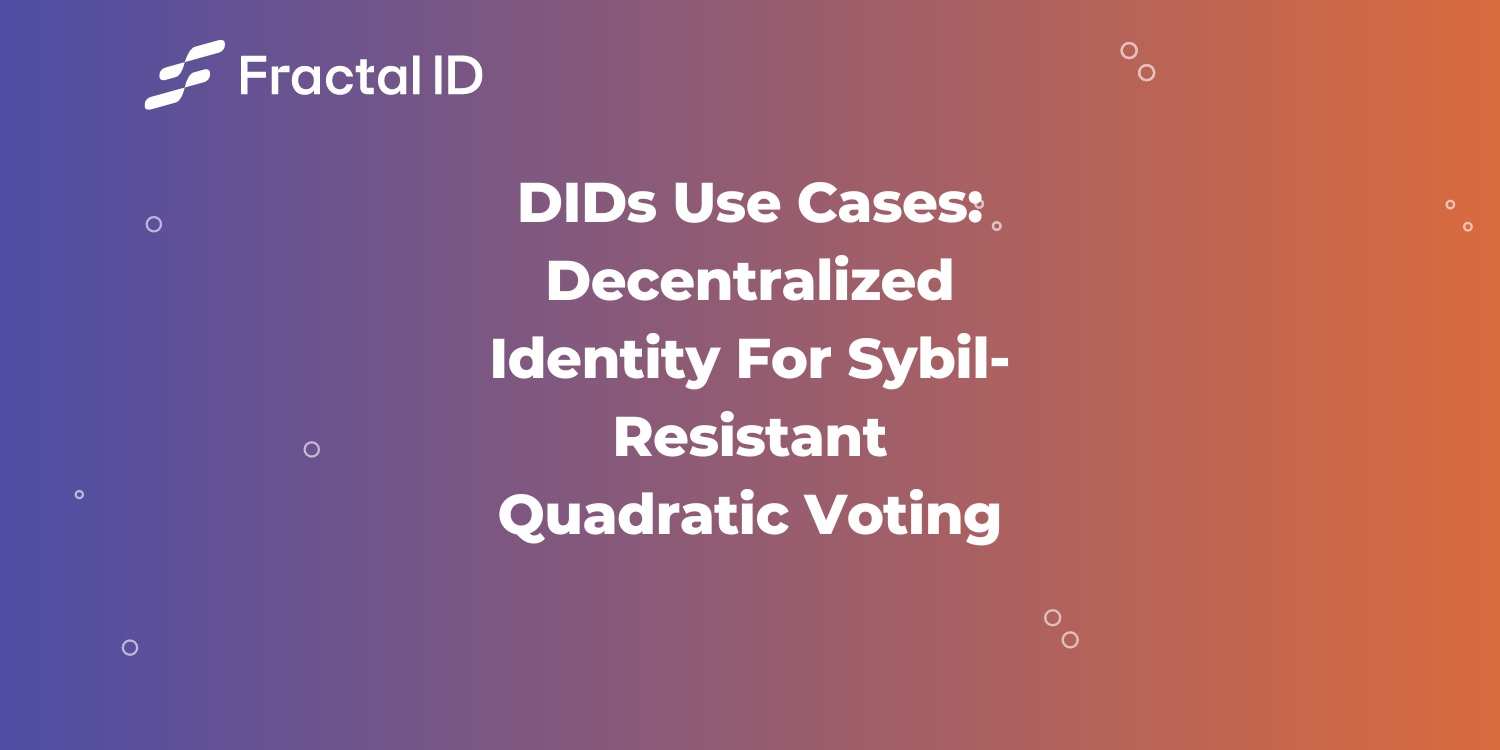In our recent article about the safety of DeFi, we talked about the challenges that face the DeFi industry due to the anonymous nature of its users, and we explored how deploying KYC and an identity layer to DeFi platforms can help mitigate the risks of scams, identity theft, and other illicit activities, reassure regulators about DeFi platforms’ compliance, and evidently foster DeFi’s mass adoption.
In this article, we explore how decentralized identity can enable sybil-resistant quadratic voting and nurture decentralized governance.
What is quadratic voting?
Quadratic voting is a collective decision-making procedure which involves individuals allocating votes to express the degree of their preferences, rather than just the direction of their preferences.
In quadratic voting, each member is allowed to pay for “more votes” up to a specified budget (voting credit) in a quadratic manner.
To simplify, let’s imagine a user has 100 tokens of voting credit, and each vote costs 1 token. If the user is interested in voting for a specific project, one vote will cost 1 token, a second vote will cost 4 tokens (2ˆ2), a third vote will cost 9 tokens (3ˆ2), and so on.
You can say, the quadratic voting formula is: cost to the voter = (number of votes)ˆ2.
One of the benefits of leveraging quadratic voting in DAOs is that this mechanism provides a better way to make collective decisions that endorses the vote of the few who care.
As Forbes interprets it, Vitalik Buterin believes quadratic voting to be a leading candidate to address governance problems blockchain communities face as it prevents a single group from quietly taking it over.
A person has to purchase votes for or against a proposal by paying into a fund the square of the number of votes that they buy. At the end of each governance cycle, all tokens cast as votes are redistributed evenly between the voters. In turn, this will take a group many cycles and a costly number of tokens to take control, likely alerting the rest of the blockchain users to the issue to take action.

Figure 1. Because the nth vote has a cost of n, the number of votes a user makes is proportional to how much they value one unit of influence over the decision, and hence proportional to how much they care about a certain project. Source: vitalik.ca
Tackling the challenges of quadratic voting
One of the greatest challenges that face quadratic voting is sybil attacks where the same user can create multiple identities to vote for the same project with their 1st vote costs, and manipulate the final result of the vote in their favor.
A reasonable option to tackle the challenge of sybil attacks is to introduce a layer of identity and KYC to identify that each voter is a unique human being. However, traditional KYC onboarding and identity verification can come across as a violation of the privacy-preserving nature of DAOs, and discourage users from participation.
This is where decentralized identity solutions come into play!
As explained in our in-depth guide, decentralized identifiers (DIDs) bring back the ownership of the data into the hands of users by enabling them to store the data on their wallets on their devices, and allowing them to choose to whom they want to disclose specific data.
In other words, users with decentralized identities can provide DAOs with a verifiable credential that proves their uniqueness without disclosing any information about their identity.
Since decentralized identifiers are unique and private, leveraging DIDs for DAOs maintains the privacy-preserving nature of DAOs and enables decentralized governance and sybil-resistant quadratic voting.
The future of Fractal ID x CrowdSwap partnership
We have recently partnered with CrowdSwap, the cross-chain opportunity provider for decentralized finance (DeFi), to bring more trust and safety to the DeFi environment while maintaining data privacy, and one part of our collaboration is to provide DIDs for CrowdSwap’s quadratic-voting-based applications.
CrowdSwap is on its path to become a Decentralized Autonomous Organization (DAO). One of the most vital requirements of a DAO is its voting system that is the backbone of the organization. Every decision that is made for the organization requires the votes of its participants. However, this true democratization of matters in a DAO needs to be ensured via a voting system that is reliable, decentralized and cheat-proof. To make sure that these criteria are met, the uniqueness of votes needs to be guaranteed.
Ensuring unique voting through a well-established voting structure has got other advantages as well. Just like the case of traditional organizations, DAOs have shareholders who have invested in them by pooling their resources together with the aim of advancing the affairs of the organization. In return, the DAO is also responsible towards its shareholders to make sure that they get their shares of the revenues gained. To avoid the risk of fraudulent voting, the DAO needs to make sure that each voter account can only have one vote.
As CrowdSwap will start using quadratic voting for governance polls, it’s crucial for their growing project to prevent circumventing this approach by multiple wallets exploiting the system. Thus, CrowdSwap will collaborate with Fractal ID to implement decentralized identifiers that ensure the uniqueness of voters by implementing a 1 biometrical facemap = 1 Fractal ID account method. In turn, this ensures users can only have one identity to vote with and evidently, sybil-resistant quadratic voting.
We are proud of trying to make DeFi a better, safer and a more democratic place for the community.
